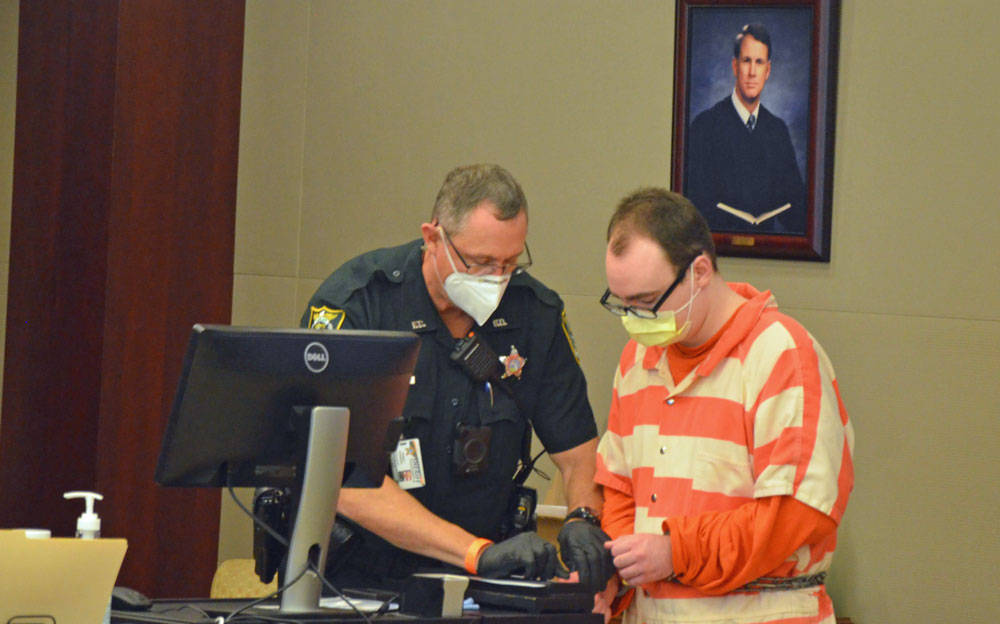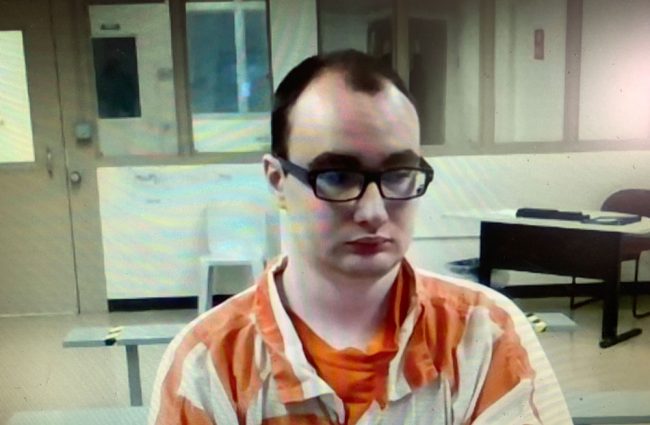
Nathaniel Shimmel, the 25-year-old Palm Coast resident facing a first-degree murder charge in the stabbing death of his mother Michele three years ago, pleaded guilty this morning to second-degree murder. Circuit Judge Terence Perkins sentenced him to 50 years in prison, closing the homicide case of longest date on the Flagler court’s docket.
Shimmel had faced the possibility of life in prison. His 50-year sentence will be followed by lifetime probation. He’s been at the Flagler County jail since the day of the murder, Aug. 23, 2017. So he gets 1,211 days’ credit for time served, or three years and a third. He is required to serve a minimum of 85 percent of his sentence, or 42 and a half years. With his credit, and if he maintains good behavior in prison, he will be eligible to leave prison in 39 years, around early 2060, when Shimmel will be 64.
The prosecution consulted with Michele Shimmel’s family before the plea, and agreed to the terms, as family members wanted closure. Shimmel has a sister. His parents had divorced a few years before the murder. His father had lived in St. Augustine but has been out of touch more recently.
The brief hearing before Perkins was uneventful but for the fact that Shimmel appeared in court in person for the first time since the coronavirus pandemic, with Assistant State Attorney Mark Johnson, who has been prosecuting the case in the last several months, and Assistant Public Defenders Rosemary Peoples and Matt Phillips. Others appeared by Zoom.
The judge went through a long list of questions to establish that Shimmel was understanding the terms of the sentence exactly, and that he was pleading willingly and without coercion. The judge asked Shimmel if he wanted to make a statement to the court. Shimmel said no.
“Do you suffer from any medical conditions?” Perkins asked him.
“Asperger’s,” Shimmel said, referring to a disorder characterized by difficulties in social interactions and communications.
“What type of symptoms does that produce?”
There was a long silence. Shimmel turned to his attorney. He then said: “Having problems with eye contact, for one, inability to make quick decisions. There’s a list, but I can’t go through it now.”
The evening of the murder at 47 Woodhollow Lane in Palm Coast, where Shimmel had been living with his mother, he and Michele had gotten into the latest of many arguments about Nathaniel’s indecision about making something of himself. Her last words to her son: “Look at me when I’m talking to you.” He said she grabbed him as she was yelling at him, and he “just panicked,” he would later tell investigators. “It just happened.” He picked up a knife and repeatedly stabbed her. He then called 911 and at first blamed a masked assailant. He would eventually confess during an interrogation with detectives, describing his acts and his mother’s death in front of his eyes with precise details, crying between fits of description. His mother had fought back and pleaded but was overpowered. Nathaniel told detectives he watched her bleed out and die.
A psychological evaluation determined him to be on the autism spectrum, but Shimmel was high-functioning. He’d graduated high school, attended classes at Daytona State College–he said he wasn’t sure what he wanted to major in–and had built his own computer.
“It appears for today you’re not having trouble making eye contact with me, is that correct?” Perkins asked Shimmel, who looked and spoke like any ordinary young man answering routine questions without trouble.
“Yes,” Shimmel said.
Shimmel then pleaded no contest, was adjudicated guilty and sentenced. His probation terms mean that he will be subject to random, warrantless searches for the rest of his life. He will be required to remain in the county absent special permission to leave. He will be barred from frequenting bars or using drugs and will be subjected to random drug-testing. Probation violations could result in his return to prison. He will be required to pay monthly costs for his probation supervision, but the judge agreed to delay those costs kicking in six months after he is released from prison.
There was only one other request from the defense: Shimmel wanted his glasses returned. The glasses were “an important piece of evidence” for the prosecution. “We can’t release those at this time,” Johnson said. The reason: the case may yet be appealed, so the glasses still have evidentiary value. The judge agreed that they would be withheld.
Although this is an agreed resolution of the case you have an absolute right to appeal the court’s sentence,” the judge said. Such appeals are routine. They go to the Fifth District Court of Appeal in Daytona Beach. They very rarely result in reversals, especially in a plea agreement.
Today’s disposition removes one of the more vexing cases from the court’s docket. Perkins had previously described himself “embarrassed” by the many delays that had attended the case, more recently because of the pandemic, making a jury trial with 12 jurors and two alternates especially difficult to carry out. No felony trials are scheduled through the end of the year, but January’s docket is heavy. Absent a plea, Shimmel’s trial had tentatively been scheduled for this week, though it is unlikely the judge would have allowed it to go forward due to the continuing high load of coronavirus cases in the county.
![]()






























Mark Hanley says
A truly evil spawn….
His tears where those of a man caught with no way out. Mourning his own capture… complete devil incarnate!